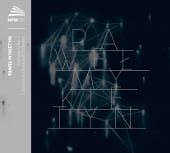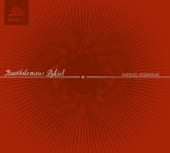PĘKIEL, B.: Masses (Wrocław Baroque Ensemble, Kosendiak)
Bartłomiej Pękiel: Missa a 14; Canon a 6: Tres Canones Simul Cantatur 1; Missa senza le cerimonie; Canon a 6: Aliud. sex vocibus; Missa Paschalis; Canon a 6: Aliud. Sex vocibus; Missa senza le cerimonie II; Missa Concertata La Lombardesca
Wrocław Baroque Ensemble, Andrzej Kosendiak – conductor
ACD 240
This release is devoted to the mass – a musical form that has been present in European music since the Middle Ages. The mass cycles presented on this album are diverse in style, which shows with how much variety the 17th-century composers approached this form, even within their own body of work.
 Discoveries: Polish Cello Quartet
Discoveries: Polish Cello Quartet
Prosper Van Eechaute: Pièce Sonate pour 4 violoncelles Op. 9; Rudolf Matz: Quartet in D minor for four cellos; Kazimierz Wiłkomirski: Ballade and Rhapsody for cello quartet; Alfredo Piatti: In vacanza quartettino per violoncelli
Polish Cello Quartet: Tomasz Daroch, Wojciech Fudala, Krzysztof Karpeta, Adam Krzeszowiec
ACD 237
The Polish Cello Quartet (PCQ)—Tomasz Daroch, Wojciech Fudala, Krzysztof Karpeta, and Adam Krzeszowiec—was founded in 2011 by graduates of the Łódź and Katowice conservatoires, who continued their studies in, among others, Brussels, Cologne and Mannheim. It is the only ensemble of this kind in Poland and one of few of this class in Europe. Since 2014, PCQ is the resident ensemble of the National Forum of Music in Wrocław and a regular guest at Wrocław festivals such as Wratislavia Cantans, Musica Electronica Nova and Jazztopad. They have also appeard at the Internationaal Kamermuziekfestival Schiermonnikoog in the Netherlands and Music Masters on Air (MusMA)—the platform for European festivals presenting new directions in contemporary music—and the Poznań Chamber Music Festival Q’arto Mondi.
The four young virtuosos have one goal: to put the cello quartet in line with other chamber ensembles embedded in tradition and well established on stage. To accomplish this, they wander several paths, however sticking to the principle of building their repertoire of pieces written originally for a cello quartet by composers familiar with the specifics of this instrument, its technical and expressive capacity, and above all with its ‘rhetorical’ potential in the partnership of chamber playing.
 MYKIETYN, P.: Symphony No. 2 / Flute Concerto (Długosz, Wrocław Philharmonic, Shwartz)
MYKIETYN, P.: Symphony No. 2 / Flute Concerto (Długosz, Wrocław Philharmonic, Shwartz)
Paweł Mykietyn: Symphony No. 2; Concerto for flute and orchestra
Łukasz Długosz – flute, NFM Wrocław Philharmonic, Benjamin Shwartz – conductor
ACD 236
Professionally one of the busiest composers in today’s Poland, Pawel Mykietyn writes music for traditional chamber, orchestral and vocal-instrumental forces as well as for the modern electronic media. His collaboration with the cult theatre director Krzysztof Warlikowski has continued for more than twenty years, and he also works on specific projects with other Polish stage celebrities, such as Grzegorz Jarzyna. Since 2000, he has also provided music for the silver screen, winning four Golden Lions at Gdynia Film Festival and two Eagles – Polish Film Awards between 2004 and 2014 as the author of soundtracks for such films as Mariusz Trelinski’s The Egoist, Malgorzata Szumowska’s Stranger, 33 Scenes from Life, Sponsoring, In the Name Of…, Andrzej Wajda’s Sweet Rush and Walesa: Man of Hope, as well as Jerzy Skolimowski’s Essential Killing and 11 Minutes. In just one decade, Mykietyn achieved in this field more than his colleagues associated permanently with the film industry have accomplished in their entire lifetime. Mykietyn is also the music director of Warsaw’s Nowy Theatre and the artistic director of the International Chamber Music Festival ‘Music on the Heights’ in Zakopane. He serves on the juries of numerous competitions for composers and advises many young composers on their work. Like it or not (and frequently it may not quite be to the composer’s liking), Pawel Mykietyn has become a real one-man institution, even though he has only recently turned 45…
 Episodi
Episodi
Peteris Vasks: Episodi e Canto perpetuo; Henry Cowell: Trio in Nine Short Movements HC 941; Rodion Shchedrin: Three Funny Pieces; Paul Schoenfield: Café Music
AdAstra Piano Trio: Anna Szabelka – violin, Łukasz Frant – cello, Joanna Galon-Frant – piano
ACD 231
Episodi is a debut release by the well-established AdAstra Piano Trio ensemble, spanning a diverse selection of 20th-century American and Easter European compositions. The choice of works to be included was by no means fortuitous, and each of the recorded pieces carries a deep personal meaning to the artists.
The music material creates a space where moods fluctuate between the extremes of high-pitched drama and humorous lightness, a realm that scintillates with a fantastic array of colors, emotions, and unconventional means of expression, whose refreshing forms are far from what could be considered a classical approach to this genre of music. Undeniably, it is this complexity and versatility — resulting, among other things, from the composers’ distant geographical backgrounds — that underlie the choice of repertoire for the album, and whose vivid presentation became not only the greatest challenge for the musicians, but also their shared artistic goal.
